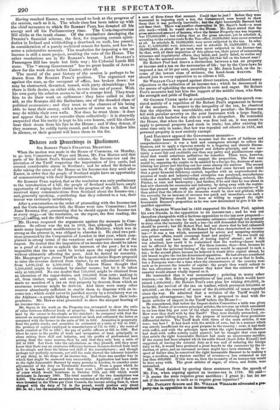Having reached Easter, we turn round to look at the
progress of the session, such as it is. The whole time has been taken up with the chief measures to which Sir ROBERT PEEL has devoted all his energy and all his Parliamentary time. The Corn-importation Bill sticks at the tenth clause. Of the resolutions developing the Premier's financial scheme, the first, for imposing certain spirit- duties in Ireland and withholding a drawback on malt, has passed, in consideration of a purely technical reason for haste, and has be- come a substantive measure. The resolution for imposing a tax on income is still a mere project, awaiting the vote of the House. The other resolutions are in Sir ROBERT'S breast. Lord STANLEY'S Passengers Bill has made but little way ; his Colonial Lands Bill none. The "strong Government" has no great bundle of Acts to show for the work done before Easter, after all. The moral of the past history of the session is perhaps to be drawn from Sir ROBERT PEEL'S position. The organized war against the man, as the occupant of office, has broken down : he may be obstructed, thwarted, teased, with party skirmishings; but there is little desire, on either side, to vote him out of power. With his own party his relation seems to be of a strange kind. They trust him to do their work on sufferance : they have called to their aid, as the Romans did the Barbarians, one of the dreaded class of political economists ; and they trust to the chances of his being able to beat their enemy, with a reserve of terror as to what he may do within their own walls. Nor does he trust them : it does not appear that he ever consults them collectively : it is shrewdly suspected that his tactic is kept to his own bosom, until his clients hear their doom from his lips in the House ; and if they demur, if they murmur, he coldly turns round, and tells them to follow him in silence, or their general will leave them to the foe.


























 Previous page
Previous page